It’s officially summer. The calendar doesn’t say so yet, but the publishing houses have sure jumped the season. There is an annual tradition among publishing companies to close up shop by one in the afternoon. I tried to call or email five different publishers on Friday, and was told by each one’s voice mail message or return email: they were closed early for Friday in the summer. Now, before I get hopped on by folks who work in publishing, I realize there is supposed to be a protocol that requires that these Friday off-hours get made up during the week. But still.
So, let me get one thing straight, the publishing companies just close once a week four to five hours early, just ‘cuz. Is it too hot to work on books? Does the A/C in all the buildings cease to function after noon? I’m not aware of any other business that closes early for an entire season. I think it’s a pretty cool idea, as the folks I know who work in publishing seem to be hard workers. And if I worked in publishing, I’d be dancing out the door every Friday at one, too.
I guess I don’t understand how a whole industry can just stop working. I can’t get events confirmed, I can’t talk to someone who literally just called me because they’ve gone for the day. I’m on the East Coast, I can only imagine how frustrating it is for West Coast stores who must finish all their Friday business by 10 in the morning. That’s not a schedule I’d like.
So, while the bookstores actually ramp up their business, those lucky few get a really great weekend for three months. I just hope that some of the publishing staffers frequent the indies wherever they have their summer shares.
Monthly Archives: June 2011
Summer Reading Time
Josie Leavitt - June 10, 2011
I might be a week or two ahead of the calendar, but it sure feels like summer here in Vermont. And thus, the ritual of summer has begun: the dreaded summer reading lists are out.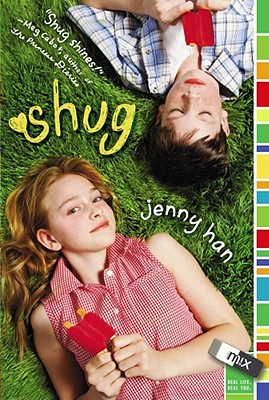
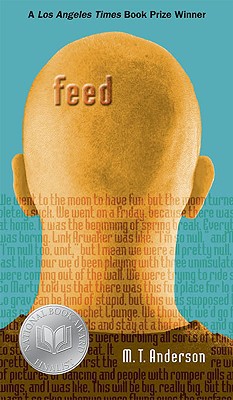 I might have said this in a previous post, but I didn’t have massive amounts of homework to do during the summer when I was a kid. We didn’t have Internet, or cable TV, and honestly, during the summer we often got bored. I loved it. There were two camp options, sleep away or day camp. Neither held any appeal for me, so I stayed home, and read.
I might have said this in a previous post, but I didn’t have massive amounts of homework to do during the summer when I was a kid. We didn’t have Internet, or cable TV, and honestly, during the summer we often got bored. I loved it. There were two camp options, sleep away or day camp. Neither held any appeal for me, so I stayed home, and read.
Yes, I had a summer reading list. It was simple, pick any three books you want to read and read them. That’s what I took home. Pick three and read ’em. There were times I felt oppressed by this because I went to a Quaker school and I knew there was n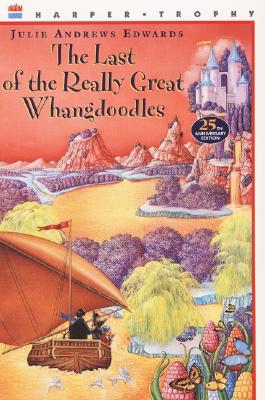 o way they were going accept a book report on a Judith Krantz novel, or even some of the Peter Straub
o way they were going accept a book report on a Judith Krantz novel, or even some of the Peter Straub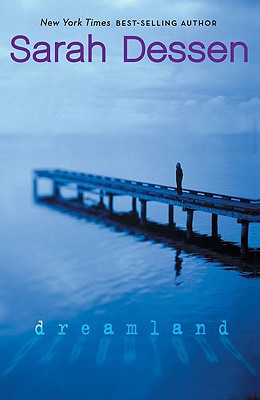 books I loved, but I read them anyway.
books I loved, but I read them anyway.
I asked this last year, and I’m going to do it again now: if you were creating the perfect summer reading list for middle graders and young adults, what four books would you choose?
I’ll get the ball rolling by listing a few of the books I tend to recommend to kids to read in the summer:
– Feed by M.T. Anderson
– Shug by Jenny Han
– Dreamland by Sarah Dessen
– The Last of the Really Great Whangdoodles by Julie Andrews Edwards
What books would you put on the summer reading list?
Where There’s a Will…
Josie Leavitt - June 9, 2011
There is a customer who comes to my store who everyone on staff just adores. Ki is lovely, exuberant and passionate about books on CD. In fact, she is the reason we continue to stock books on CD. She refuses to download them, she thinks it’s silly; Ki just wants to hear a book from a CD as she drives back and forth to the Cape on a regular basis. She’ll listen to anything as long as it’s well written. Her tastes range from Christopher Moore, her absolute favorite, to young adult authors.
This past winter and spring, Ki was listening her way through Catherine Gilbert Murdock’s delightful Dairy Queen series. Ki was game when I told her about the book, and she raved about it when she ordered the second book in the series, The Off Season, which sh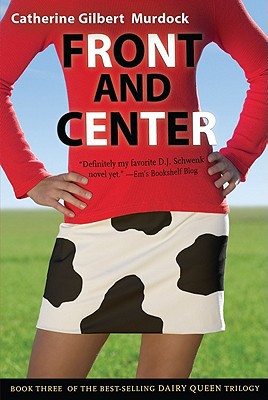 e loved as well. A problem arose with the third book, Front and Center.
e loved as well. A problem arose with the third book, Front and Center.
It seems this book was not on CD. Ki bought the paperback to tide her over until the CD came. The problem was, there is no CD of this book that’s available to bookstores. I told Ki the sad news, and she took matters into her own hands. She wrote a letter to Catherine Murdock to ask when the book would be coming out on CD. Wow! She just wrote the author about her not having a book on CD. I was impressed, but really didn’t think anything would come of it because I just didn’t think there was a CD to be had. I didn’t want to dampen Ki’s enthusiasm, so I said nothing.
Well, last week I was proven wrong in a wonderfully surprising way. Ki emailed to tell that Catherine Murdock responded to her email by telling her the audio was done for libraries but she had some at her house. She mailed Ki a copy. Not only that, but she gave Ki a few copies for the store. Wow, again. Catherine came to the store once and she was delightful, so I’m not surprised at her actions. What surprises me is the connection that these two women made.
I forget sometimes that access to authors is something I alternately take for granted and still revere. I love that Ki took it in her own hands to find one of the few copies of the CD she could. It makes me smile to think of someone writing an author and having such an exchange. And through all this, Ki could have downloaded a copy of the book months ago, but her old-fashioned love of CDs got her to actually write a letter.
Ki will bring our CDs the next time she comes in. I will listen to it, on CD, just the way Ki does, and I’ll smile the whole time.
Things I Shouldn’t Do
Josie Leavitt - June 8, 2011
A day in the life of a bookseller, especially one at a small store, finds me wearing many hats. We’ve gotten in several 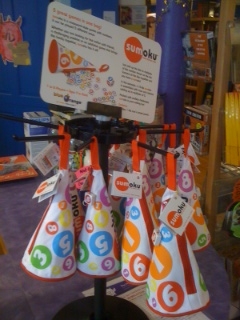 shipments of toys this week. Usually, receiving toys is Elizabeth’s domain. I don’t have the patience for it. But, she’s out of town, so I had to tackle them. You know, putting a display together is not rocket science, but there are times when it sure feels like it.
shipments of toys this week. Usually, receiving toys is Elizabeth’s domain. I don’t have the patience for it. But, she’s out of town, so I had to tackle them. You know, putting a display together is not rocket science, but there are times when it sure feels like it.
It seems each toy came with a display that needed to get set up. The first was a seemingly simple rotating four-sided block that displayed bookmarks that have motion when you move them. Adorable yes, but infuriating. There were four tabs on each side to fit the bookmark in. You would think this was neurosurgery for how long it took me to get those bookmarks in the block. It was as if my hands grew to ten times their normal size; bumbling fingers twice almost broke the tabs on the block. So, what should have taken five minutes took me twenty frustrating minutes.
The next batch of toys all had their own displays. Oh, joy, I thought, six displays to set up. The first four went great. Easy, sensible, didn’t need the instructions I didn’t have. Setting up a hanging display for pouches of toys should have come with instructions. It’s always a bad sign when I’m done putting all the pieces together and there’s a part left. The sad part comes in when I can’t figure out why I needed that part. So, I saved the part in the drawer and hope it comes in handy later. Things were going well, though, and all that was left was the header.
Putting in the header, usually a piece of cardboard that fits in on top of the display, is self-explanatory, unless you’re me. The header seemed to not only not fit, but where it is was supposed to go was so wobbly it kept sliding out. I looked and looked, and could see no way for anything to fit any better, so I resorted to a classic Vermont fix: duct tape.
Everything looks great, until it spins.
Young Adult Fiction Is Not All Doom and Gloom
Josie Leavitt - June 6, 2011
This weekend the Internet, specifically Twitter and Facebook, have been seriously abuzz about an article in the Wall Street Journal Saturday written by Meghan Cox Gurdon. In the article “Darkness Too Visible,” the writer has focused on a few admittedly dark novels and classified the whole genre as bleak and fairly unredemptive.
As a bookseller, I was struck immediately by the first two paragraphs:
Amy Freeman, a 46-year-old mother of three, stood recently in the young-adult section of her local Barnes & Noble, in Bethesda, Md., feeling thwarted and disheartened.
She had popped into the bookstore to pick up a welcome-home gift for her 13-year-old, who had been away. Hundreds of lurid and dramatic covers stood on the racks before her, and there was, she felt, “nothing, not a thing, that I could imagine giving my daughter. It was all vampires and suicide and self-mutilation, this dark, dark stuff.” She left the store empty-handed.
Well, if Amy Freeman had shopped at an independent bookstore someone would have asked her if she needed help. The staffer would have offered help and most likely, the indie would have been well stocked in other types of YA, say Sarah Dessen, Laurie Halse Anderson, John Green, or David Levithan, to name just a few. There is never a reason for someone to leave a bookstore empty-handed, especially when they’re on a mission as broad as wanting a book for a 13-year-old.
On one hand, I agree with one point the author is making: there is a glut of gory, dark and somewhat gloomy YA literature out there. But, to some extent it reflects the times we’re in. Teens are committing suicide because of bullying, eating disorders are common, even kids in “nice” neighborhoods have drug problems, and kids sometimes get pregnant. And sadly, some kids grow up in abused households with alcoholic parents. Reading about kids with alcoholic parents can make a kid feel better. Kids reading about cutting will not make them cutters. It might, however, make them recognize when one of their friends is cutting and could use help.
“Issue” books have always been popular with teens. They’re popular because they discuss things kids feel or talk 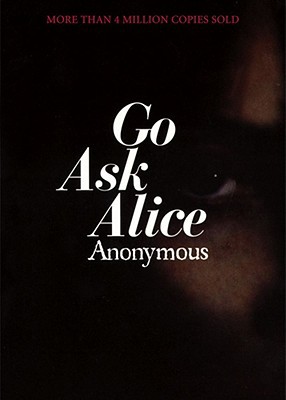 about. While I didn’t have a drug problem and was not a runaway, I loved Go Ask Alice. And if I were a teen now, I’d be reading Crank,
about. While I didn’t have a drug problem and was not a runaway, I loved Go Ask Alice. And if I were a teen now, I’d be reading Crank, 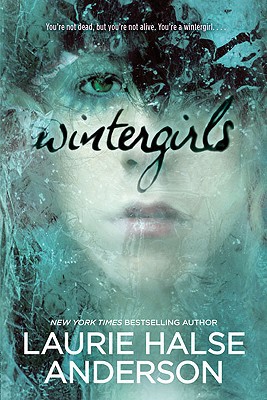 Wintergirls, and Empress of the World.
Wintergirls, and Empress of the World.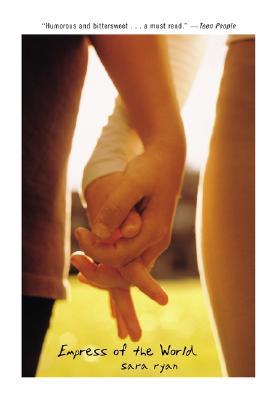 Teens seek out issues that are applicable to their lives or just to learn more. When I sell these books, I tell the parent, or the teen, what the book is about and how honestly it deals with its topic. Wintergirls is a tough read, but oh so powerful. I understood anorexia so much better for having read it. Imagine how a teen would feel reading it if they had a friend they were worried about, or they were worried about themselves. To read someone else’s intense struggle with an eating disorder, and the redemptive ending, can give someone hope.
Teens seek out issues that are applicable to their lives or just to learn more. When I sell these books, I tell the parent, or the teen, what the book is about and how honestly it deals with its topic. Wintergirls is a tough read, but oh so powerful. I understood anorexia so much better for having read it. Imagine how a teen would feel reading it if they had a friend they were worried about, or they were worried about themselves. To read someone else’s intense struggle with an eating disorder, and the redemptive ending, can give someone hope.
There’s a Twitter group right now called #YASaves and its focus is on the good that young adult books can do. They can save lives by exposing kids to things. We had a young man walk six miles round trip to our store once a week several summers ago. Why was he walking to our store? Because he felt safe at our store, and he was exploring his sexuality through our book recommendations. We suggested some Alex Sanchez books, and suddenly this kid didn’t feel so alone, so hopeless. Several years later his mother called us and tearfully told us that we had saved his life because he was feeling suicidal until he started reading those books. We didn’t save his life; reading about other gay teens saved his life.
The article ends with this: The book business exists to sell books; parents exist to rear children, and oughtn’t be daunted by cries of censorship. No family is obliged to acquiesce when publishers use the vehicle of fundamental free-expression principles to try to bulldoze coarseness or misery into their children’s lives.
Where are the booksellers, the librarians in this woman’s argument? Experts exist for a reason. If parents, or teens for that matter (who actually do a pretty damn good job of self-selecting what they’re comfortable reading), are feeling besieged by what they think are the only books out there, then talk to a bookseller about what you feel is appropriate for your child to be reading. Any bookseller or librarian worth his or her salt can recommend a list of books as long as your arm to counter the gloom that can be found in the YA section, that both parent and teen will be happy to read. The author spoke scathingly of Lauren Myracle’s Shine, a tough book to be sure about gay bashing, but hardly fitting for the 13-year-old whose mom wanted to get her a book. Why not get her Myracle’s other YA book, Peace, Love and Baby Ducks, instead? There is balance to everything, and it’s just so unfortunate that Meghan Cox Gurdon’s article had none.
Mr. Popper’s Penguins: The Book, the Movie, the DVD
Elizabeth Bluemle - June 3, 2011
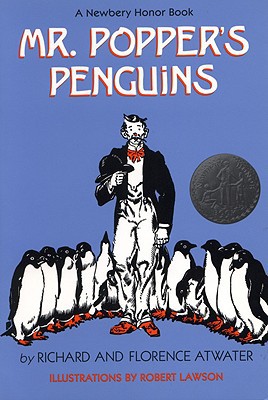 In college, I made a friend, a writing buddy who’s been my good pal for almost — holy cow! — thirty years. We both headed to L.A. after college, where our families lived, and got entry-level jobs in “the business” (the entertainment industry, that is). We’d hang out at a pub at the Beverly Center on La Cienega Boulevard, and fiddle around trying to co-write a screenplay, or at least come up with an idea for one. We didn’t get a lot of writing done, but we were amusing enough that the manager sent us over free drinks. Good times.
In college, I made a friend, a writing buddy who’s been my good pal for almost — holy cow! — thirty years. We both headed to L.A. after college, where our families lived, and got entry-level jobs in “the business” (the entertainment industry, that is). We’d hang out at a pub at the Beverly Center on La Cienega Boulevard, and fiddle around trying to co-write a screenplay, or at least come up with an idea for one. We didn’t get a lot of writing done, but we were amusing enough that the manager sent us over free drinks. Good times.
Gregg stayed on in L.A., continued with his screenwriting dream, and made it happen. He even found a writing partner who actually WROTE! Imagine. Fast forward to January 2011, when I hear from my pal that he is working on the DVD extras for the Mr. Popper’s Penguins movie, based on the Newbery Honor book by Richard and Florence Atwater. Gregg is currently a producer and a writer, and does a variety of all things movie, including scripting DVD extras for Hollywood films. What’s great about Gregg, among other things, is that he’s a reader and a dad, and appreciates children’s literature to a degree that can be unusual in his field. He proposed (and received approval for) a segment for the DVD that celebrates the book and its authors, shares the history of the book’s creation and legacy, and includes interviews with the Atwater estate and children’s book experts.
As his resident children’s book professional friend, Gregg contacted me to see if I would be interviewed for the DVD. As much as I *love* the idea of The Flying Pig being represented on a gajillion DVD watchers, I knew that really, he needed to speak with a true expert on children’s book history, and so I hooked him up with the legendary Anita Silvey.
Yesterday, two of my worlds collided when I drove to Boston to Anita’s house on the tail end of the film crew and Gregg interviewing her. What a pleasure to see the fruitful endeavors of two wonderful people from different parts of my life! (The only downside was that, because of rights issues, some of Anita’s marvelous children’s book art had to be removed from the background before they could film her.)
I have no idea how the movie’s release will affect book sales. While the movie itself bears almost no relationship to the book upon which it was based (that’s a topic for another post; sigh), at least there will be some representation of the original creation on the DVD. Happily, the movie tie-in paperback is still the original story — which is one of the most charming, delightful children’s novels ever written (and illustrated by the marvelous Robert Lawson, too).
Apparently the movie is also charming in its own right; I just wish that it were clearer to families that it was inspired by the book, not a mirror of it, and that kids will still want to read the book after seeing the movie.
My suggestion to all of us — booksellers, authors, teachers, librarians, parents, aunts, uncles, etc. — is to grab a copy of Mr. Popper’s Penguins before the movie’s release on June 24, and let a new generation of children fall in love with it all over again. Then, when they see the movie, you can have some great conversations about the differences. And then make sure to watch that DVD when it’s released, and think of my friend and Anita and the Atwater family helping to make sure that the book lives on!
The Best Staff Meeting Ever
Josie Leavitt - June 2, 2011
It’s not every day that I gather my staff to play. Usually staff meetings are information-sharing affairs that can be enjoyable, but seldom would anyone call them fun. Yesterday was different.
At BEA last week we were inspired to go look at a new toy company, Blue Orange. This company is one of the hot toy companies that all our bookstore colleagues were raving about. Elizabeth went to their booth and then spent half an hour texting me about our previously agreed upon budget and how it was just too low. Well, several hundred dollars later above budget, the order was made. I thought that would be the end of it until we received the order.
Little did I know that Blue Orange was going to come to the store and teach the staff how to play their games. What a great idea. It’s one thing to be able to talk about a game, but it’s an entirely different thing to tell customers how much fun you had playing the game. Florian, a lovely young man from Blue Orange, arrived at 8:3o yesterday for our staff meeting. I must say, there were some staffers who wondered if this meeting was mandatory, as they weren’t sure of its purpose. By the end of the first game, all were converted and all were ready to win.
We played every game we had ordered, asking questions along the way and thinking out loud about different ways to handsell the games. We played Trigger, a seemingly simple game of answering true or false questions using your right hand or left hand to hit the “trigger” depending on your answer. I don’t listen well, and that was abundantly apparent during the game. I was wrong often and if that weren’t bad enough, my dyslexia had me using the wrong hand for my answers. It was funny and by paying attention to our mistakes, we could better see what might be hard for kids, and adults, about some games.
The fun continued through rounds of Yamslam, a Yahtzee-type game that is full of strategy. One thing that was really interesting about playing all these games was to see who on staff was really competitive and who was happy to just play. We laughed a lot and all of us wanted to take more turns with each game. The game that proved to be the most challenging, for me at least, was Sumoku, a numbers-based game that is a lot like the word game Bananagrams. The fun of this game is it’s wonderful for folks who don’t really like word games, or can’t read yet. I’m not good at math, so I found this oddly challenging, but I can’t wait to play it with my family this summer.
The game that was a lot of fun for all us to play was Gobblet Gobblers, a tic-tac-toe game that allows you to take your opponent’s piece and to cover their piece with your piece. Basically, the very simple game of tic-tac-toe has been elevated to a much higher level of thought than what you’ve ever played. A memory game called Pengoloo revealed the real nature of all of us. You can steal the penguin of another player if the egg under the penguin body is the color you need. Most of us hesitated to steal penguins, except one of us. She stole with glee and a sense of “this is how you play the game.” We all just about howled. After the ever-patient Florian left, we all started talking about having our first ever Game Night at the store. Just in time for summer, and with all the rain we’ve had, people would do well to stock up on fun games the whole family can play.
Everyone left the meeting happy, laughing and thinking about what games they wanted to add to their family toy chest. I left the meeting thinking about other ways to make staff meetings this much fun all the time.
The Power of Writers
Josie Leavitt - June 1, 2011
I was thrilled to see Laurie Halse Anderson last week at the Children’s Auction. She looked marvelous in her flowing gown and was delightful as always. The week of BEA was a book-filled blur that had most of us miss the blow-by-blow devastation that occurred in Joplin, Missouri because of an enormous tornado.
When I returned home I saw something from Laurie on my Facebook feed. She had started a contest to help the folks of Joplin. Her contest was simple: donate to the Red Cross via the Ozark chapter website and for every ten dollars you donate, your name would get thrown in a hat for a chance to have Laurie critique a manuscript of yours, up to 400 pages. Okay, so how cool is that? I don’t even have a manuscript for Laurie to look at and I gave money just because it’s such a wonderful idea. And it’s selfless.
So far, with the contest six hours from finishing, it looks like she’s helped raised over $4,000. I can’t believe it. One person’s great idea, a massive Facebook following (Laurie has almost 5,000 friends) and people who perhaps needed a nudge to give have created tremendous results.
This reminds me in some way of what Carrie Jones and Megan Kelley Hall did last year when they responded to a teen’s suicide, not by lamenting, but by starting a group: Young Adult Authors Against Bullying. I blogged about it last year. And now, just months later, the book, Dear Bully, an anthology with contributions from more than 70 authors, is coming out in August.
Writers are in unique positions to create change. And I’m thrilled that writers such as Laurie Halse Anderson, Megan Kelley Hall and Carrie Jones are giving of themselves to make the world a better place for folks who’ve suffered unbelievable tragedies or daily torments we’ll never know about. I am glad I made a donation to the folks of Joplin and I can’t wait to sell Dear Bully when it comes out. I am not a writer, but I can support writers who are making decisions to reach outside themselves and do what they can to make the world a little easier for folks they haven’t even met.
